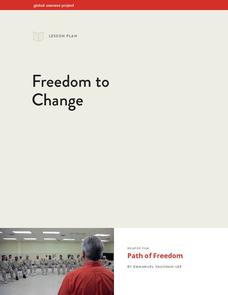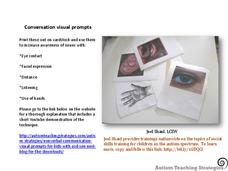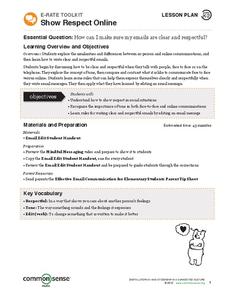National History Day
“Saving the Bear”: The Russian Expeditionary Force of World War One
How have Russian politics affected countries on a global stage? The discussion of the Russian Revolution and World War I begins with an analysis of primary resource letters. Learners finish with a project where they create a timeline of...
Smithsonian Institution
Mobilizing Children
Scholars find out how the government used propaganda to mobilize children to help in the war effort. Lesson exercises include analyzing a quote from Franklin Roosevelt, viewing propaganda images and posters, and participating in a lively...
Global Oneness Project
Freedom to Change
Here's something unusual and thoughtful: have your scholars do some pensive reflection themselves before tackling how such meditative techniques are used in prison rehabilitation programs. They watch the...
Nebraska Department of Education
Curriculum For Careers
Learners explore potential learning, earning, and living goals that align with their personal goals and interests in a comprehensive unit that includes complete lesson plans, interactive notebooks, worksheets, overheads, rubrics,...
Nuffield Foundation
Observing Earthworm Locomotion
One acre of land can contain more than a million earthworms. Scholars collect earthworms to observe their movements. Once placed on paper, the sound of movement often fascinates pupils. When placed on glass, the earthworm is unable to...
Curated OER
Volleyball Unit
Bump, set, and serve a load of volleyball skills to your young athletes. Packed with volleyball terms, rules, and drills, players learn the basics of volleyball. Take the game outside to the sand once players have perfected their...
Population Connection
Where Do We Grow from Here?
Did you know that the population is expected to grow to 11 billion by 2100? The resource serves final installment in a six-part series on the global population and its effects. Scholars interpret data from the United Nations about the...
Curated OER
Conversation Visual Prompts
Help learners understand the importance and proper placement of non-verbal communication using these visual prompts. This set includes graphics to remind students to listen (ear), keep personal space (ruler), use the right facial...
Name Parts of a Computer and Terms for Interface Elements
Familiarize your young learners with the parts of a computer and some basic key terms relating to technology. As the teacher demonstrates using an LCD projector, class members practice moving a mouse, opening the Internet, typing in a...
University of Pennsylvania
Using Political Postcards to Teach a Revolution of Political Thought
Discuss how political postcards affected everyday people's thoughts and beliefs. Pupils continue a unit on the Dreyfus Affair as they engage in class discussion, watch a video, view a PowerPoint presentation, and fill out worksheets to...
University of Pennsylvania
From the Dreyfus Affair to the World Today
Historical events do not occur in a vacuum. Such is the case of the Dreyfus Affair, where the connection between Captain Alfred Dreyfus, Emile Zola, and Hannah Arendt is fused by the events of the early 20th century. The informative...
Austin Independent School District
Forearm Pass/Setting
Here is a beautifully designed volleyball lesson plan on the forearm pass/bump and overhead pass/set. It includes a detailed multimedia presentation and set of instructional guidelines, skill cues, and lists of strategies for...
CCEA
Home Economics: Teen Building
Learners explore the emotional and nutritional needs of teenagers in a six-lesson unit, which covers such topics as food sources, cooking skills, emotional well-being, and the positive effect of food and family occasions.
University of Texas
Alphabetic Understanding, Phonics, and Spelling
Have your youngsters reading in no time with with collection of literacy activities and lessons. Starting with a basic understanding of the alphabet, this unit progressively builds students' phonemic awareness and ability to decode...
Carolina K-12
How Do I Pre-Register and Vote in North Carolina?
Did you know that in some states your pupils can pre-register to vote? Teach the advantages to pre-registering and engage the classroom in an intriguing discussion about youth voting trends. Class members participates in a live polling...
NASA
The Cycle of Matter
An educational lesson focuses on the idea of conservation of matter through a demonstration of the water cycle, a discussion of digesting food, and the path of carbon and oxygen atoms as they change form.
Oceanic Research Group
Heat Transfer and Cooling
Astronauts train underwater to simulate the change in gravity. An out-of-this-world unit includes three hands-on activities, one teacher demonstration, and a discussion related to some of the challenges astronauts face. Scholars apply...
American Chemical Society
Energy Foundations
Only 10 percent of an incandescent bulb's energy is used to create light; the remaining 90 percent is heat. In the unit of activities, young chemists examine energy through hands-on activities, videos, discussions, and...
A&E Television
The World Wars
Contemporaneously known as The Great War, World War I had never seen its match on the global stage—until World War II. An engaging set of resources designed to extend a viewing of the History Channel's The World Wars features...
Edible Schoolyard
Pan de los Muertos
Accompany instruction and the celebration of El Dia de los Muertos with a loaf of Pan de los Muertos. Here, scholars measure ingredients precisely to create tasty bread, write a remembrance for someone who has...
Healthy Native Youth
Chapter 5: Learning About HIV/AIDS/STI's and Hepatitis Transmission
Middle schoolers delve deep into facts about HIV, AIDS, Hepatitis, and other STI's by way of discussion and a hands-on activity. Scholars ask and discuss questions anonymously using a Question Box. Two experiments showcase the...
Common Sense Media
Show Respect Online
Through discussion and a variety of worksheet types, pupils learn to review their e-mails for grammar, appropriateness, and respect before sending.
Center for Learning in Action
Water—Changing States (Part 1)
Here is part one of a two-part lesson in which scholars investigate the changing states of water—liquid, solid, and gas. With grand conversation and up to three demonstrations, learners make predictions about what they think will happen...
Center for Learning in Action
Water – Changing States (Part 2)
Here is part two of a two-part lesson in which scholars investigate the changing states of water—liquid, solid, and gas—and how energy from heat changes its molecules. With grand conversation, two demonstrations, and one hands-on...
Other popular searches
- Map Skills
- Life Skills
- Literacy
- Social Skills
- Social Skills Lesson Plans
- Library Skills
- Dictionary Skills
- Map Skills Lesson Plans
- Study Skills
- Compass Skills
- Writing Skills
- Reading Comprehension Skills























